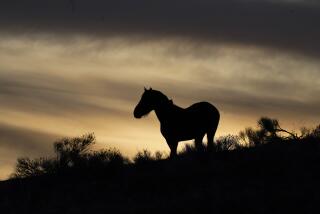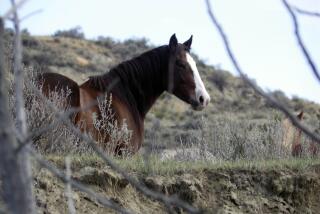Wild Horses Couldn’t Drag Bidders Away From a Deal at Auction
Some people may look at the 80 mustangs up for adoption in Thousand Oaks this weekend and see untamed, unpredictable horses, difficult to train and expensive to care for.
Troy Becker of Ojai sees perfect horses, untainted by humans. They are smart and physically superior mustangs that have endured the natural selection process, devoid of problems that can come with controlled breeding, he said. And they are blank slates when it comes to instruction, perfect for the natural methods, or “Horse Whisperer” style, used by Becker’s trainer.
“Natural selection seems to work better than humans getting into the process,” said Becker, 38. “And they’re not screwed up by other trainers.”
Becker acquired two horses Saturday at the Wild Horse and Burro Adoption run by the federal Bureau of Land Management at Conejo Creek Equestrian Park. Federal wranglers had removed the horses and 20 burros from herds roaming public lands in California and Nevada. By midafternoon, 38 of the animals had been adopted, and BLM spokesman Doran Sanchez expected at least 20 more to leave for new homes by this evening.
The adoption weekend is part of a 31-year-old program of monitoring wild herds and removing animals before land is overgrazed and there isn’t enough food for wild animals and ranch cattle. The BLM is in the third year of a four-year program to cut the number of wild horses and burros in the U.S. by half, Sanchez said. In the last two years, extensive droughts and wildfires have destroyed thousands of acres of horse and burro habitat, necessitating many emergency evacuations in Nevada, Utah and Wyoming.
The adoptions are held several times a month throughout the country and have resulted in the placement of more than 197,000 animals. Adoption fees offset some of the cost of the program, Sanchez said.
Most of the mustangs sell for the minimum cost of $125, but a couple of the horses sparked bidding wars in the silent auction Saturday. For the top bid of $350, Becker walked away with the most popular mustang, a reddish-brown yearling larger than most of the other horses. The gelding has strong, healthy-looking feet and good posture, Becker said. It also seems to be calm and friendly.
“Physically, it’s beautiful,” said Becker, who already owns 30 horses. “And it seemed to have a good connection with our trainer.”
The wild mustangs are a good deal, because domesticated horses sell for at least five times as much, Sanchez said. The low prices have raised fears that some horses might be slaughtered for their meat, but the BLM enforces several regulations to protect them. New owners must have experience training or raising horses, enough money to care for the animals and a record free of animal-cruelty convictions. They must also have safe, well-made corrals that provide shade and meet size requirements.
Bureau representatives check on the animals in their new homes to make sure they are being cared for and then, after one year, ownership is transferred to the adopters.
“That’s our primary goal, to find these guys a good home,” Sanchez said.
While the horses are a bargain, training them takes a strong commitment, said Phil West, a Mono County sheriff’s deputy who has adopted nine mustangs and led demonstrations on training Saturday.
“With a wild horse, an adopter needs to realize their biggest investment is going to be of themselves, their time,” West said.
That’s exactly what Amy Bauer of Moorpark plans to invest in the male yearling with the “sweet face and pretty round eyes” that she bought for her 7-year-old granddaughter, Julianne.
“You have to fall in love with them or they’re not worth having,” said Bauer, 53. “You’ve got to give them a lot of slow, sweet love.”
The auction continues today at the park from 8 a.m. to 5 p.m.
More to Read
Sign up for Essential California
The most important California stories and recommendations in your inbox every morning.
You may occasionally receive promotional content from the Los Angeles Times.










